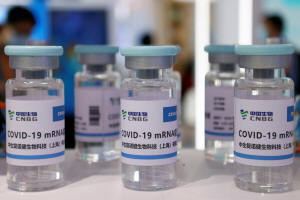mRNA vaccines not linked to miscarriage; COVID-19 shots in U.S. still
protect against severe disease
 Send a link to a friend
Send a link to a friend
[September 14, 2021]
By Nancy Lapid
(Reuters) - The following is a summary of
some recent studies on COVID-19. They include research that warrants
further study to corroborate the findings and that have yet to be
certified by peer review.
mRNA vaccines not linked with pregnancy loss
Miscarriages do not occur more often in pregnant women who receive an
mRNA vaccine against COVID-19, according to a new study. Researchers
analyzed data from eight U.S. health systems on 105,446 women who were
between 6 and 19 weeks into their pregnancies. Among them, 7.8% had
received at least one dose of the Pfizer/BioNTech vaccine and 6% had
received at least one shot of Moderna's. Overall, 13,160 women suffered
miscarriages, but the risk within a month after vaccination was no
different than among those who did not get vaccinated, according to a
report published on Wednesday in JAMA. The researchers acknowledge that
they may have been missing some data. For example, they did not know the
women's previous pregnancy histories. Still, they conclude, their
findings will help doctors counsel pregnant women in their
decision-making about the vaccines.
U.S. vaccines are protective against Delta variant
All three COVID-19 vaccines in use in the United States are effective at
preventing hospitalizations and urgent or emergency care visits caused
by the Delta variant of the coronavirus, although Moderna's shots appear
to be most effective, according to national data collected in June, July
and August as Delta became predominant. Researchers with the U.S.
Centers for Disease Control and Prevention (CDC) tracked nearly 33,000
urgent care or emergency department visits and hospital admissions of
adults with COVID-19-like illnesses. Compared to people who were fully
vaccinated, unvaccinated individuals were five- to seven-times more
likely to test positive for the coronavirus, the researchers found.
Vaccine efficacy against urgent care or emergency department visits "was
highest among Moderna vaccine recipients (92%), followed by Pfizer/BioNTech
vaccine recipients (77%), and was lowest (65%) for Janssen (Johnson &
Johnson) vaccine recipients," the researchers reported on Friday in the
CDC's Morbidity and Mortality Weekly Report. The pattern was similar for
hospitalizations. "These findings reaffirm" that all three vaccines
afford "high protection" against coronavirus infections that make people
sick enough to seek urgent or emergency care or be hospitalized, the CDC
said.
[to top of second column]
|

Vials representing the mRNA coronavirus disease (COVID-19) vaccine
candidate developed by Sinopharm's China National Biotec Group (CNBG)
are seen displayed at its booth at the 2021 China International Fair
for Trade in Services (CIFTIS) in Beijing, China September 3, 2021.
REUTERS/Florence Lo

COVID-19 autopsies yield clues for researchers
Sophisticated molecular tools are helping pathologists uncover new
avenues for COVID-19 research during autopsies of patients who died
from the disease. "By comparing the molecular signatures of infected
and uninfected tissues, we were able to identify four major ....
pathways driving severe COVID-19," said Elisabet Pujadas of the
Icahn School of Medicine at Mount Sinai in New York City. Those
pathways involve blood vessels, cell-signaling proteins called
cytokines, and cell activation, structure and degradation, she and
her colleagues explained in a report published on Wednesday in The
American Journal of Pathology https://bit.ly/3hufdrB. "Specific
genes within those pathways can help explain why we see excessive
inflammation and clotting and thus constitute exciting targets for
potential new therapies that are aimed directly at the core of the
problem," Pujadas said. The research also found that while the
coronavirus is known to use a cell surface protein called ACE2 as a
"receptor," or gateway, patients' brains have high levels of other
gateway proteins the virus could potentially use, called BSg and
ANPEP. "While this does not by itself demonstrate that infection is
occurring through these receptors, it demands that we think and
study these receptors more broadly and not assume that ACE2 alone
conveys the full picture," Pujadas said.
(Reporting by Nancy Lapid; Editing by Bill Berkrot)
[© 2021 Thomson Reuters. All rights
reserved.] Copyright 2021 Reuters. All rights reserved. This material may not be published,
broadcast, rewritten or redistributed.
Thompson Reuters is solely responsible for this content. |